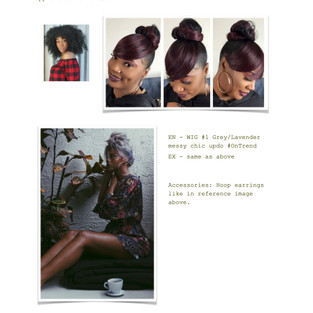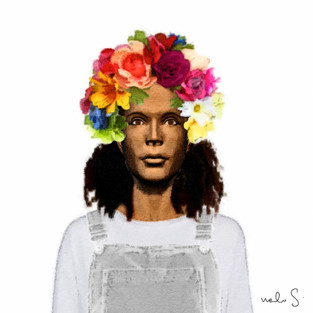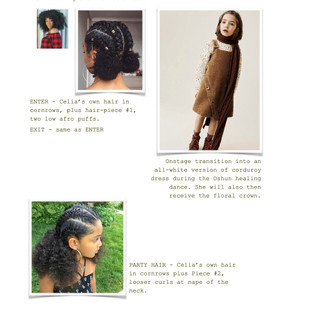THEATRE: Da Kink In My Hair - by Trey Anthony
- Nalo Bruce
- Feb 18, 2023
- 2 min read
Arts Club Theatre Production
A RESONANT MUSICAL CELEBRATION OF WOMEN OF COLOUR
“If you want to know about a woman, touch her hair.” At Novelette’s Toronto salon, captivating stories untangle as eight distinctive women narrate their lives with honesty, humour, and joy. Both heartbreaking and uplifting, ’da Kink in my Hair is a musical testament to the challenges and triumphs in the lives of contemporary Black women. - Arts Club Theatre Company press release
Pages and research excerpts from my costume design workbook:

Part our design mission was to celebrate the colour and vibrancy of women exercising autonomy over their opinions, their choices, and their place in the world regardless of how society attempts to police their appearance and behaviour.
Many of these pages show a hairstyle for entering the salon, a hairstyle for leaving the salon, as well as a chic party look for later on in the play:
For many generations, black women’s hair has been the subject of intense discrimination.
Hair styling practices have included the application of heat and chemical straightening out of the necessity to appear more “civilized”, “respectable”, and ultimately “successful” in our western post-colonial culture. This widespread and institutionalized discrimination dates back to the early 1800s and continues to the present. Recent events of note are the signing of the California and New York State laws banning racial discrimination based on natural hairstyles. These laws were signed in July of 2019 and cover the wearing of afros, braids, cornrows, fades, Bantu knots, twists and locs.
Questions can also be raised with regards to the economic gains enjoyed by leaders in the beauty industry to continue to promote the need to buy racially specific hair products to ensure their customer base. The black beauty industry is worth approximately $2.7 billion US in the United States alone.
The natural hair of the actors is conceived to be worn in beautiful and expressive protective braided styles suitable for performing with or without the wigs.

A variety of textures and detailing in the numerous wigs, hair pieces and costumes is incorporated to elaborate on the individual strength and uniqueness of each character. These tactile qualities support the heart-wrenching monologues, often hilarious dialogues, energetic musical numbers and choreographies of Da Kink.
Elements from nature, like the floral lace detailing in the veils and the Azalea flower headdresses, represent temperance, passion, womanhood, and fragility.
Traditional African spiritual practices of the Yoruba (which include Obeah, Vodou, Santeria and Candomblé) have been integrated into the play to represent periods of healing and nurturing communion.
The driving force behind all design decisions is to express a collective self-image of black women today, in its dazzling and ever-evolving complexity.
ARTISTIC TEAM
Starring
Celia Aloma as Stacey-Anne
Jenni Burke as Miss Enid
Lossen Chambers as Patsy
Paige Fraser as Suzy
Dawn Pemberton as Nia
Monice Peter as Sherelle
Katrina Reynolds as Sharmaine
Nadine Roden as Novelette
Creative Team
Ray Hogg Director
Caitlin Hayes Music Director
Kevin McAllister Set Designer
Nalo Soyini Bruce Costume Designer
Itai Erdal Lighting Designer
Kate DeLorme Sound Designer
Pamela Jakobs Stage Manager
April Starr Land Assistant Stage Manager
































































































